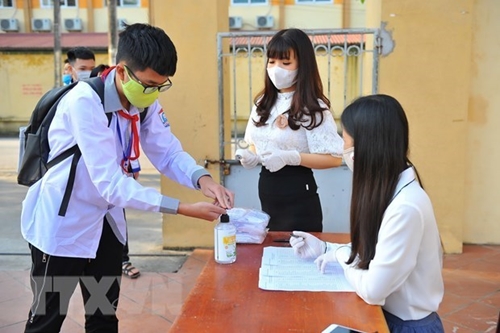This year’s Hand Hygiene Day falls as Vietnam is reaching an important milestone with the majority of students across the country returning to school in a safe and phased approach that meets international standards after months of preventive closure to contain the spread of COVID-19.
Rana Flowers, UNICEF Representative to Vietnam, said that unsafe water, inadequate sanitation and lack of hygiene affect not only the health, safety, and quality of life of children, but also their learning.
    |
 |
|
Students disinfect their hands with sanitizer. |
Therefore, providing better water, sanitation and hygiene facilities in schools not only reduces the spread of hygiene-related diseases like COVID-19 and the risk of parasite infections, but also helps to curb the number of schools days missed every year due to diarrhea, she stated.
In the coming weeks, UNICEF and its partners will distribute essential supplies to reach approximately 500,000 people, including 300,000 students in schools. They plan to distribute soap, hand sanitizers and ceramic water filters to schools, commune health centres and communities in Lao Cai, Dien Bien, Gia Lai, Kon Tum, Ninh Thuan, Ben Tre, Soc Trang provinces. These supplies will come with targeted messages and information, available in ethnic minority languages, on personal hygiene.
UNICEF remains committed to ensuring that every child has the right to be in a school that offers safe water, healthy sanitation and hygiene education.
“This is the moment to create the change we seek for all schools. As we recover, rebound and reimagine a world more fit for children after COVID 19 – I hope you will join us in taking the next steps to sustainable change in schools,” added Flowers.
Source: VNA